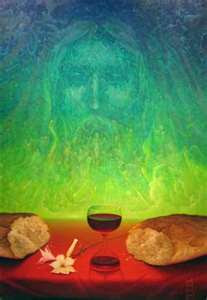Do we we fully comprehend the theological and existential significance of approaching and “gathering” around the altar, the table of the Lord, to receive Communion? And if we don’t or are still confused is it really any wonder? Let’s face it, debate about the meaning of the Eucharist continues even now in this relatively tranquil ecumenical period between and within different denominations. The sacrament holds a pivotal place in the Church, in that it is central to our life of faith and yet can also be so very confusing.
John writes (John 6:24-35), “How can this man give us his flesh to eat...Whoever eats my flesh and drinks my blood remains in me and I in him.” In their literal interpretation these phrases had quite an impact on John’s audience then as they do now. He is speaking to us in the present time as directly as he did in his time.
St. Augustine attempts to clarify the connection between sacraments and our daily lives with his use of the phrase “visible words.” I find this phrase attractive because it helps me appreciate the Eucharist as the visible, physical reference to the presence of Christ in our lives. The Eucharist is the embodiment of the proclaimed and heard gospel and through imagery and our ability to relate to their physical forms, they enable us to bridge the metaphorical words of John with our humanity, and God’s incarnation in Jesus…through him and with him. As we fully absorb his presence in water, bread, and wine, we become incorporated into the “trinity.” When the word of God in scripture and the sacramental rites have worked their way through our senses and penetrate to the intuitive level of our being, the immense energies of the Spirit are released and our consciousness is gradually transformed into the mind of Christ. (Thomas Keating, The Mystery of Christ, p2)
The liturgy does not offer us a mere seat in the bleachers, or even a ringside seat. We are invited to participate in the event itself, to absorb its meaning and to relate to Christ on every level of his being as well as our own. The main thrust of the liturgy is to develop a relationship with Christ and engage all our faculties: the will, intellect, memory, imagination, senses and body. The transmission of the personal relationships through him…with the Father. It empowers us as we celebrate the mysteries of Christ, to not only perceive them as historical events but as manifestations of Christ here and now. (Thomas Keating, The Mystery of Christ, p8)

No comments:
Post a Comment